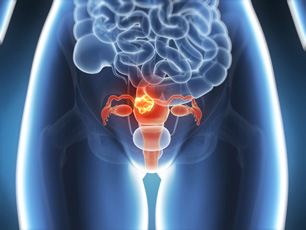
U terine (Endometrial) cancer originates in the female reproductive system and generally affects postmenopausal women between ages 50 and 60;. It develops in the body of the uterus or womb whose wall has an inner lining (called the endometrium) and an outer layer of muscle tissue (called the myometrium).
Endometrial cancer (Uterine Cancer) is often detected at an early stage because it frequently produces vaginal bleeding between menstrual periods or after menopause. If discovered early, this slow-growing cancer is likely to be confined to the uterus. Removing the uterus surgically (Hysterectomy) successfully eliminates endometrial cancer, if detected and carried out in the initial stages.
Symptom of uterine cancer
Examples of abnormal vaginal bleeding include :
• Bleeding which starts after the menopause (in post-menopausal women)
• Bleeding between periods.
• Heavier periods than normal (in pre-menopausal women).
• Abnormal vaginal discharge.
Having had a recent normal cervical screening test (smear test) doesn't mean that you don't have uterine cancer. A smear test involves a scrape of cells from the surface of the cervix. The cervix is the lower part of the uterus. Occasionally a smear test may show signs of a cancer of the lining of the womb, but this is unusual.
Other, less common, symptoms of uterine cancer are :
• pain in the lower abdomen (tummy), back or legs
• swelling in the abdomen or legs
• loss of appetite and weight
• constipation
• being sick (vomiting)
• passing urine more than usual
• tiredness and weakness.
• Stage 1 : In this stage, cancer is confined to the womb. Stage 1 has been categorized into two types –
o Stage 1A: The cancer has developed in the muscle wall of the womb.
o Stage 1B: The cancer has developed more in the muscle wall of the womb.
• Stage 2 : The second stage is marked by the spread of the cancer to the cervix
• Stage 3 : In the third stage, the cancer has spread to more parts. This stage can be categorized into three types –
o Stage 3A: The cancer has now developed in the ovaries
o Stage 3B: The cancer has now spread to the tissues nearby the womb or in the vagina.
o Stage 3C: The lymph glands are also affected by this cancer.
• Stage 4 :The fourth stage is marked by the spread of the cancer to other body organ. This stage is further categorized into two types –
o Stage 4A: The bladder or bowel is no affected by the cancer.
o Stage 4B: The cancer has spread to different organs that include brain, lungs, bones or liver.

A vaginal examination is done when a patient had symptoms caused by the endometrial cancer. A patient may have an enlarged uterus. Some other tests are also required for diagnosing uterine cancer that include –
Hysteroscopy: A thin telescope known as a hysteroscope is used and is passed through the cervix into the uterus. This telescope helps in viewing the lining of the uterus and tissue samples (a biopsy) of abnormal areas can also be taken.
Endometrial Sampling: A thin tube is passed in the uterus for obtaining small samples of the endometrium by using mild suction. This procedure is performed on an out-patient basis. Abnormal cancer cells in the sample are then examined under a microscope.
Ultrasound Scan of the Uterus: This test is considered as a primary test for determining uterine cancer. This painless and safe scan makes use of sound waves for creating images of the structures within the body and also of the organs. Ultrasound scan of the uterus is used frequently in pregnant women. The womb of a woman can be scanned by placing the probe of a scanner on the abdomen. The placement of a small probe is also done within the vagina for scanning the uterus from a specific angle.

There are a number of treatment options available for uterine cancer that include –
• Radiation Therapy : High-energy radiation beams are used in this therapy for killing the cancer cells. Radiation therapy is also recommended for reducing the risk of recurrence after surgery. Also this therapy is also beneficial after surgery for shrinking the tumor so that can be easily removed. This therapy may involve:
o Radiation given within the body : This involves the placement of a radiation-filled device like a cylinder, small seeds or wires within the vagina for a short duration. This process is known as internal radiation or Brachytherapy.
o Radiation given through a machine outside the body : This process makes use of machine that is placed outside the body. The radiation is then directed at a specific point in the body and this process is known as external beam radiation.
• Surgery : Surgery is considered as the most recommended treatment option for uterine cancer. A surgical procedure is performed for removing the uterus (hysterectomy), ovaries and fallopian tubes. Surgery also helps in determining the extent of the cancer that has spread in the other areas around the uterus. The stage of the cancer can also be determined by removing the lymph nodes.
• Chemotherapy : Certain types of chemicals are used for killing the cancer cells. One or more chemotherapy drugs may also be combined. The injection of these drugs can be done either through the mouth or into the veins. Women who are suffering from recurrent or advanced stage of uterine cancer that has spread beyond the uterus are treated with the help of chemotherapy. The drugs then enter into the bloodstream that moves in the entire body for destroying the cancer cells.
• Hormone Therapy : The hormone levels in the body can get affected by taking certain medications. This therapy is ideal for those who are suffering from advanced uterine cancer that has spread beyond the uterus.
You may want to ask some questions before your treatment begins:

Mr.Gilbert, Knee Replacement, Nigeria
Mr.Gilbert from Aba, Nigeria who came to India for his knee replacement in India.
Mrs. Kalangwa George, Lung Cancer, Kenya
Mrs. Kalangwa George from Mombasa, Kenya who came to India for her Lung Cancer Treatment in India.
Mrs. Elisabeth, Breast Cancer Surgery, Nigeria
Mrs. Elisabeth from Kano, Nigeria who came to India for the Breast Cancer Surgery.
Mr.Tselmeg, Kazakhstan, Spine Surgery
Mr.Tselmeg from Astana, Kazakhstan who came to India for the Spine Surgery
Mr. Stephen Okafor, Spine Surgery, Nigeria
Mr. Stephen Okafor from Onitsha, Nigeria who came to India for the Spine Surgery
Mrs. Asiata Nofiu, Laparoscopic Ovarian Cystectomy , Nigeria
Mrs. Asiata Nofiu from Lagos, Nigeria who came to India for the Laparoscopic Ovarian Cystectomy
Mr. Alhassan Osman, Prostate Treatment, Tanzania
Mr. Alhassan Osman from Mwanza, Tanzania who came to India for the Prostate Treatment
Mr. Okubowa Babatunde , Heart Surgery , Zimbabwe
Mr. Okubowa Babatunde from Harare, Zimbabwe who came to India for the heart hole surgery